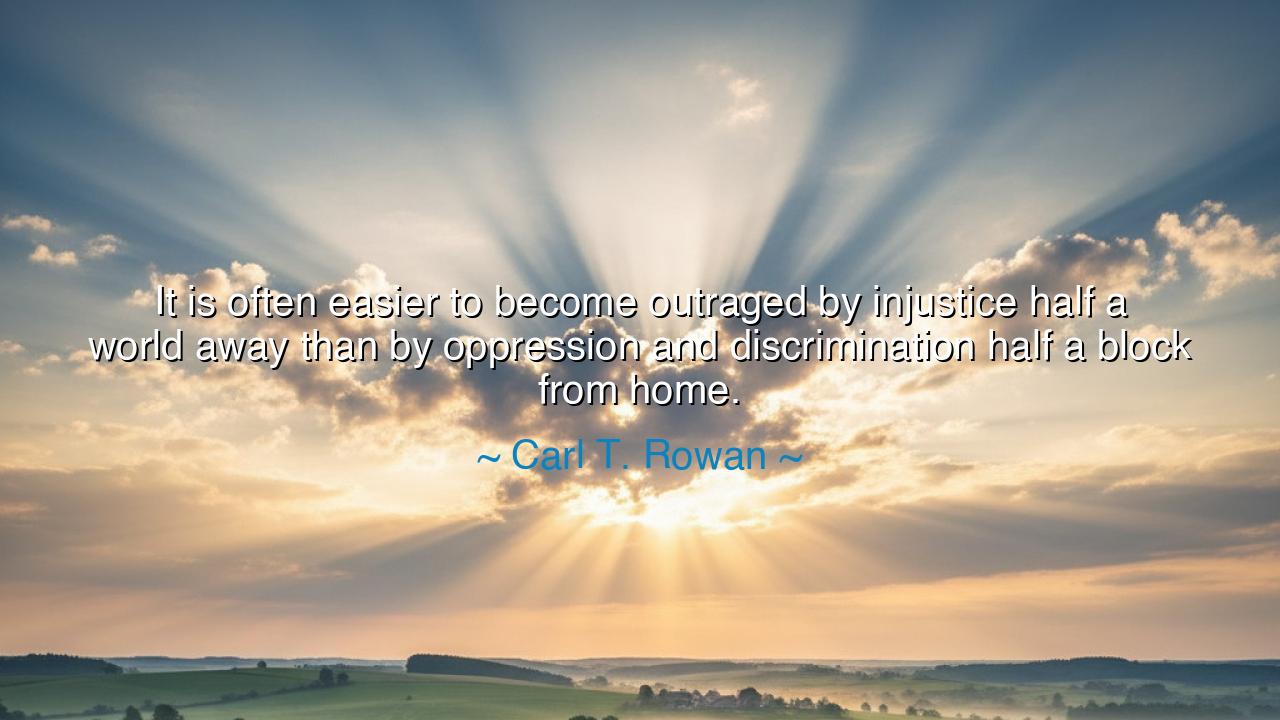
It is often easier to become outraged by injustice half a world
It is often easier to become outraged by injustice half a world away than by oppression and discrimination half a block from home.






The words of Carl T. Rowan — “It is often easier to become outraged by injustice half a world away than by oppression and discrimination half a block from home.” — resound with the weight of moral truth. They strike the human heart like a bell of conscience, calling us to awaken from hypocrisy. Rowan, a journalist and civil rights advocate, understood the strange blindness of mankind: that people will march for distant causes, weep for faraway suffering, and yet remain silent before the injustice that festers in their own streets. His words are not an accusation alone — they are a mirror. For within them lies the challenge of genuine compassion: to care not only for the abstract and far, but for the immediate and uncomfortable truth that stands before our eyes.
In his time, Carl Rowan saw both the beauty and the betrayal of his nation. As one of the first prominent Black columnists and diplomats in twentieth-century America, he witnessed a country that proclaimed freedom abroad while tolerating racism and discrimination at home. He wrote during the long struggle for civil rights, when America spoke of democracy in foreign lands but denied equality to its own citizens. His words were not born of cynicism, but of grief and clarity. He understood that moral outrage, when not rooted in one’s own backyard, becomes performance — a cry of conscience without consequence. It is easy to condemn the tyrant in another nation; it is hard to confront the prejudice in one’s own neighbor.
This is a truth as old as humanity. The prophets of every age have warned of it. Isaiah cried out to Israel for fasting and prayer while the poor starved at their gates. Socrates questioned the citizens of Athens for praising virtue in theory but abandoning it in practice. And even in the modern world, nations that preach liberty abroad often harbor injustice within. Rowan’s words echo this ancient lesson: that moral distance grants comfort. To pity the suffering of those far away costs little; but to face the injustice near us demands courage, humility, and change.
Consider, my children, the story of the abolitionists who fought slavery in the nineteenth century. Many were noble and true, yet some who condemned bondage in the South refused to treat the freedman or the immigrant as their equal in the North. They saw evil in others but not in themselves. Likewise, in our own age, it is common to see men and women raise their voices against wars, foreign tyrannies, or distant suffering, while turning a blind eye to poverty, homelessness, or racial inequality that exist just beyond their doors. They share petitions, they speak of justice in lofty terms, yet they will not look into the weary eyes of the oppressed who pass them on the street. Such is the danger Rowan names — the illusion of righteousness without the labor of empathy.
But his words are not meant to shame; they are meant to awaken. For true compassion begins not with grand gestures, but with small acts of courage. It begins in the heart, and then in the home, and then in the street. To confront the injustice “half a block from home” is to risk one’s comfort, reputation, and pride. It is to stand against friends, traditions, and systems that benefit us. Yet it is only in this kind of confrontation that love becomes real and justice becomes alive. The cry for justice must begin with the self — with the examination of one’s own silence, one’s own complicity, one’s own walls of indifference.
Thus, Rowan’s wisdom teaches that the battle for morality is not fought on distant shores, but within the neighborhoods of the soul. The truest heroes are not only those who fight against foreign evil, but those who fight against the familiar — the quiet cruelty of exclusion, the hidden prejudice in language and thought, the daily injustices that go unseen because they are ordinary. The one who can look upon his own community, his own family, his own habits, and see where injustice hides — that person has begun the real work of liberation.
So remember this, O seekers of justice: do not let your compassion end where your comfort begins. It is noble to feel sorrow for the oppressed in lands you will never see, but nobler still to heal the suffering before your eyes. Listen to the silent cries of those nearest you. Speak truth in your workplace, in your schools, in your streets. Treat your neighbor not as a stranger, but as a soul deserving of dignity. For as Rowan reminds us, the conscience that ignores what is near cannot truly serve what is far. Let your justice be like light — not distant and abstract, but shining first upon the ground where you stand.






AAdministratorAdministrator
Welcome, honored guests. Please leave a comment, we will respond soon